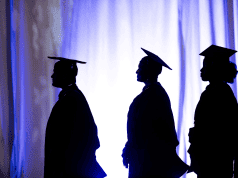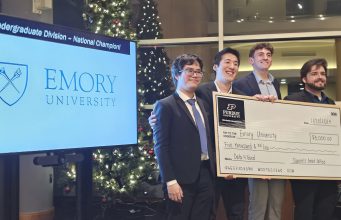Curtis Chin estimates that his family’s restaurant, Chung’s—founded by his great-grandfather in 1940—sold over 10 million egg rolls.
Those eggrolls were distributed to a remarkably diverse clientele. Situated near Detroit’s red-light district and new Chinatown, it was literally and figuratively a cultural crossroads.
The restaurant remained steadfast through decades of frothing political and social tumult, Detroit being a textbook case of urban boom and bust and a prominent figure in the national conversation surrounding Civil Rights and race relations. It was also the landscape in which Chin—activist, filmmaker and author of his memoir, “Everything I Learned I Learned in a Chinese Restaurant“—grew up, formed his identity and learned to embrace his sexuality as a gay man.
For Hannah Chiou 26MBA, participant in this year’s “Read Watch Listen Experience Learn” program, all the big, important and political layers of the book hit in a more personal way.
“This book was so special to me. As a 30-something Taiwanese-American raised in the Southeastern United States, I grew up in an environment with almost no exposure to the stories and history of the Asian American community. I felt seen by the internal conflicts he had forming his identity while living amongst different communities—Black, Asian, conservative, and liberal. It was a representation of what it has meant for me to live in Atlanta for the last 10 years. Beautiful, in a pain-staking way of finding confidence in your identity when you don’t quite ‘fit’ into one box.”
A Welcoming Space for Difficult Conversation

Formerly known as “Common Read,” the “Read Watch Listen Experience Learn” program provides a forum for self-education and a welcoming space for honest dialogue for those seeking to be allies of marginalized communities. Through books, podcasts, videos and more, Emory faculty, staff, alumni, and students explore a range of topics, seeking to understand stereotypes and unconscious bias, become effective allies, and develop anti-racist mindsets.

“Read Watch Listen Experience Learn” began four years ago after the murder of George Floyd rocked the nation. In the wake of the news, Associate Dean of Full-Time MBA Programs Brian Mitchell spearheaded a campaign with the help of several Emory faculty and staff members to bring the issues of racism, prejudice and privilege to the forefront of conversation. When the Goizueta DEI council was formed a year later, the council took ownership of the program and elected to invite students to that conversation as well.
“I introduced the Common Read concept in 2016 with ‘Whistling Vivaldi’ by Claude Steele as a book that explored the concepts of stereotype threat and unconscious bias,” says Mitchell. “The discussions that emerged from that shared experience were deeply meaningful, and an example of the opportunities we have to make our community more than simply the place we come to work every day. Today, through the work of the DEI Council, the series has become more accessible and therefore more valuable because of the increased perspectives in the debrief discussions.”
Each year, a small group of faculty and staff within the “Read Watch Listen Experience Learn” community gather to brainstorm ideas for next year’s topic and media, which are then brought back to the DEI council for feedback.
In 2021, the cohort read “The Sum of Us: What Racism Costs Everyone and How We Can Prosper Together” by Heather McGhee, which explores the communal, global benefits of coming together across race to build an equitable future. The group dissected Pamela Newkirk’s Diversity Inc.: The Fight for Racial Equality in the Workplace in 2022, which delves beyond well-meaning corporate buzzwords to illuminate what strategies are actually effective in improving access and opportunity for all. In 2023, the school unpacked the topic of poverty through Stephanie Land’s memoir Maid.
Building Community by Going Off Script

The “Read Watch Listen Experience Learn” program has two primary aims: The first is to further people’s understanding of DEI issues in society. The second is to build a sense of community across the school.
In small groups, students, faculty and staff get a chance to show up as more than just their job titles. The discussions around Curtis Chin’s memoir unpacked profound questions regarding childhood, identity, and the places we call home.
If you’ve ever wondered what your faculty and professors are really like, sit with them in these slightly existential musings about life. You’ll get to hear so many stories and build relationships with folks.
Hannah Chiou
“One of the most impactful parts of our program is the opportunity for members of the Goizueta community—staff, faculty, students from various degree programs—to share our experiences and learn from each other,” says Allison Gilmore, director of admissions and student services of Goizueta’s PhD Program and co-chair of the DEI committee.
“Too often, students, faculty and staff default to their respective silos,” says Assistant Professor in the Practice of Accounting Allison Kays, and co-chair of the DEI committee along with Gilmore. “Our discussion groups allow members of the Goizueta community to come together and bond over their passion to make the world a better place. I think it can be really powerful for members of our community to come together and interact in new ways. The panel also allows us to collaborate meaningfully with other departments at Emory.”

“I thought it was challenging at times to talk about some of the topics such as coming out and feelings related to family, but it was a safe space that allowed us to learn,” says Zoe Grotjan 26BBA, another participant. “The program allows for those with different backgrounds to participate in discussions together that foster community and allow for better understanding of each other’s standpoints. I especially love how my group had such different experiences that we were able to communicate about, culminating in discussions about how to improve Goizueta.”
Unraveling Injustice, One Thread at a Time
Narrative has the unique capability to build empathy in a way that almost no other form of communication can. While participants are connecting in a new way with each other, they’re also learning to connect with the stories of protagonists who look different from themselves—at least on paper.
“In reading Chin’s memoir, I thoroughly enjoyed learning about experiences and identities that do not match my own on the surface,” says Mitchell.
The great thing about reading books—or consuming any long-form media—is that you can get past the surface level differences and realize many aspects of our shared humanity. That is how I felt after reading Chin’s book. We had far more in common in our views of the world than I thought we would. And as we discussed it during our RWLEL debrief, that sentiment was shared by everyone.
Brian Mitchell
Although these discussions happen in small and intimate groups, the potential for impact reaches much farther.
“Goizueta faculty and staff know that what happens in the ‘ivory tower’ of academia is not insular from what’s going on in the rest of the world,” says Kays. “The conversations we have or don’t have around topics like equity and access shape the experiences of the students who walk our halls and their mindsets as they move into the real world. At Goizueta, we’re helping to prepare the next generation of movers and shakers; we want them to be aware of the lived experiences of others, and to be committed to building a better and more equitable society wherever their careers land.”
Many participants discover that unraveling injustice can begin on an even smaller scale by examining themselves and their internal dialogue.
“Chin had confidence in his heritage and pride in being the son of a restaurant owner,” says Chiou. “For me, there have been many times when I wished that I had the privilege of growing up in a wealthy home and afforded the privileges of my classmates. Having confidence in my racial identity came in my adulthood but I am grateful I found it! I hope that everyone who feels their identity is pulled apart by phrases like, ‘You’re not that (Chinese).’ or ‘You act like a (fill in the blank)’ can know that the version of your cultural identity is your own.
You will always be the fullest version of yourself that you can be.
Hannah Chiou
Learn more about Goizueta’s ongoing commitment to Diversity, Equity & Inclusion.










